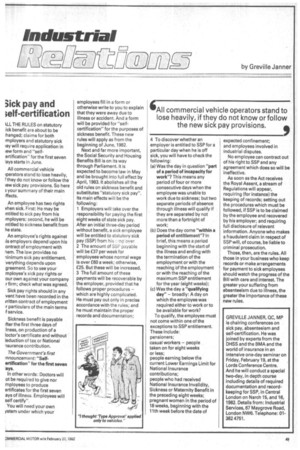5ick pay and ;elf-certification
Page 45

If you've noticed an error in this article please click here to report it so we can fix it.
Md. THE RULES on statutory ;ick benefit are about to be hanged; claims for both rnployers and statutory sick lay will require application in levy form and "self ertification" for the first seven lays starts in June.
All commercial vehicle )perators stand to lose heavily, f they do not know or follow the iew sick pay provisions. So here your summary of their main iffects.
An employee has two rights vhen sick. First: He may be intitled to sick pay from his imployers; second, he will be ntitled to sickness benefit from he state.
An employee's rights against is employers depend upon his ontract of employment with hem. The law provides no ninimum sick pay entitlement. iverything depends upon greement. So to see your mployee's sick pay rights or our own against your company ,r firm; check what was agreed.
Sick pay rights should in any vent have been recorded in the vritten contract of employment Ir particulars of the main terms if service.
Sickness benefit is payable ifter the first three days of Ilness, on production of a loctor's certificate and without leduction of tax or National nsurance contribution.
The Government's first rnnouncement: ertification" for the first seven lays.
In other words: Doctors will ot be required to give nor mployees to produce ertificates for the first seven ays of illness. Employees will self certify".
You will need your own ystem under which your employees fill in a form or otherwise write to you to explain that they were away due to illness or accident. And a form will be provided for "selfcertification" for the purposes of sickness benefit. These new rules will apply as from the beginning of June, 1982.
Next and far more important, the Social Security and Housing Benefits Bill is on its way through Parliament. It is expected to become law in May and be brought into full effect by April, 1983. It abolishes all the old rules on sickness benefit and substitutes "statutory sick pay". Its main effects will be the following: 1 Employers will take over the responsibility for paying the first eight weeks of state sick pay. After an initial three-day period without benefit, a sick employee will be entitled to statutory sick pay (SSP) from his s mp'oyer 2 The amount of SSP payable will be £37 per week for ' employees whose normal wage is over £60 a week; otherwise, £25. But these will be increased.
3 The full amount of these payments will be recoverable by the employer, provided that he follows proper procedures — which are highly complicated. He must pay out only in precise accordance with the rules; and he must maintain the proper records and documentation; 4 To discover whether an employer is entitled to SSP for a particular day when he is off sick, you will have to check the following: (a) Was the day in question "part of a period of incapacity for work"? This means any period of four or more consecutive days when the employee was unable to work due to sickness; but two separate periods of absence through illness will qualify if they are separated by not more than a fortnight of work; (b) Does the day come "within a period of entitlement"? In brief, this means a period beginning with the start of the illness and ending with the termination of the employment or with the reaching Of the employment or with the reaching of the maximum SSP entitlement for the year (eight weeks); (c) Was the day a "qualifying day" — broadly: A day on which the employee was required either to work or to be available for work? To qualify, the employee must not come within one of the exceptions to SSP entitlement.
These include: pensioners; casual workers — people taken on for eight weeks or less; people earning below the current Lower Earnings Limit for National Insurance contributions; people who had received National Insurance Invalidity, Sickness or Maternity Benefit in the preceding eight weeks; pregnant women in the period of 18 weeks, beginning with the 11th week before the date of expected confinement; and employees involved in industrial disputes.
No employee can contract out of his right to SSP and any agreement which does so will be ineffective.
As soon as the Act receives the Royal Assent, a stream of Regulations will appear, requiring (for instance) the keeping of records; setting out the procedures which must be followed, if SSP is to be claimed by the employee and recovered by his employer; and requiring full disclosure of relevant information. Anyone who makes a fraudulent claim in respect of SSP will, of course, be liable to criminal prosecution.
Those, then, are the rules. All those in your business who keep records or make arrangements for payment to sick employees should watch the progress of the Bill with care and interest. The greater your suffering from absenteeism due to illness, the greater the importance of these new rules.


















































